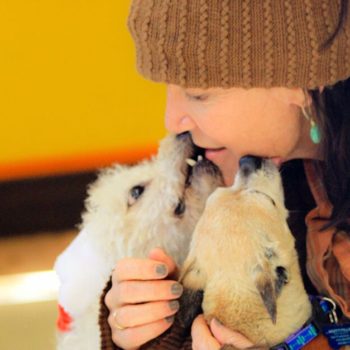How much of the “conventional wisdom” about adoption and foster programs makes sense, and how much of it just keeps your organization from saving as many animals as it could?
That was the question on Sherri Franklin’s mind as she first created Muttville Senior Dog Rescue, a San Francisco organization that has saved thousands of dogs since its founding in 2007, through its network of hundreds of foster homes. The dogs they save aren’t the proverbial “cute and cuddlies,” either; Muttville specializes in senior dogs and those with the kind of health issues that make them a challenge when trying to find new home.
For Franklin, when the answers came, it was like a light bulb went off — or, as we call it at Maddie’s Fund®, she had an Aha! Moment: If you don’t move them out, you can’t save another one.
Franklin, also a Maddie Hero, joined us at HSUS Animal Care Expo in May of 2016, where she had this to say about that moment of inspiration, and the journey that followed:
At the shelters I’d volunteered at, there were a lot of people and a lot of steps with a lot of rules about when and where and with whom an animal could leave. I knew these were all intended to protect the animal, but my experience made me doubt whether those good intentions were being met. There was lots of evidence that adding these steps didn’t really make for better adoptions.
Franklin shared the story — familiar to many in animal welfare — about friends of hers who were great pet owners and parents but were turned down for adoption because both of them worked outside the home. “Here was a great home, ready to take in a dog that needed a home and it was an opportunity lost,” she said. So when she founded her own foster-based adoption organization, she took a different approach with adoptions and with recruiting and working with foster homes:
When I founded Muttville, I didn’t have a staff to run a complicated adoption program, so partly out of necessity and a little bit of skepticism for all the rules, I created a simple system. I meet you, you fill out a form, you answer a few friendly questions, and assuming it’s the right match, you go home with a dog.
But even that system had a bottleneck: me. Did I really have to meet every single adopter? The fosters taught me that they can and want to do more. They know their dogs… best, so they can answer all the questions. They can market their dogs to their friends, neighbors, co-workers, and they can evaluate the adopter, and they can follow up.
And you know what happened? Not only were the dogs kept happy and more adoptable, not only did they get adopted more quickly, and not only did the fosters allow us to rescue a ton more dogs, but the foster families really loved it…. I’ve heard over and over again, that knowing where their foster dog goes makes all the difference for them and that’s why they love fostering for Muttville.
And a little statistic, 11 percent of our adoptions are failed fosters, but most of them actually continue fostering dogs for us even after they’ve adopted one of their foster dogs. So the conventional rules and the standard process went out the window for us. Our adoption team isn’t just a small staff, it is a huge network.
“Many lives have been saved by my first Aha! Moment, it now propels Muttville to innovate,” Franklin said. “It has become our culture to be open to those moments. It can’t hurt to try something new; it might just be the kick your organization needs. ”
View Franklin’s complete talk below, and stay with us for yet more Aha! journeys!

